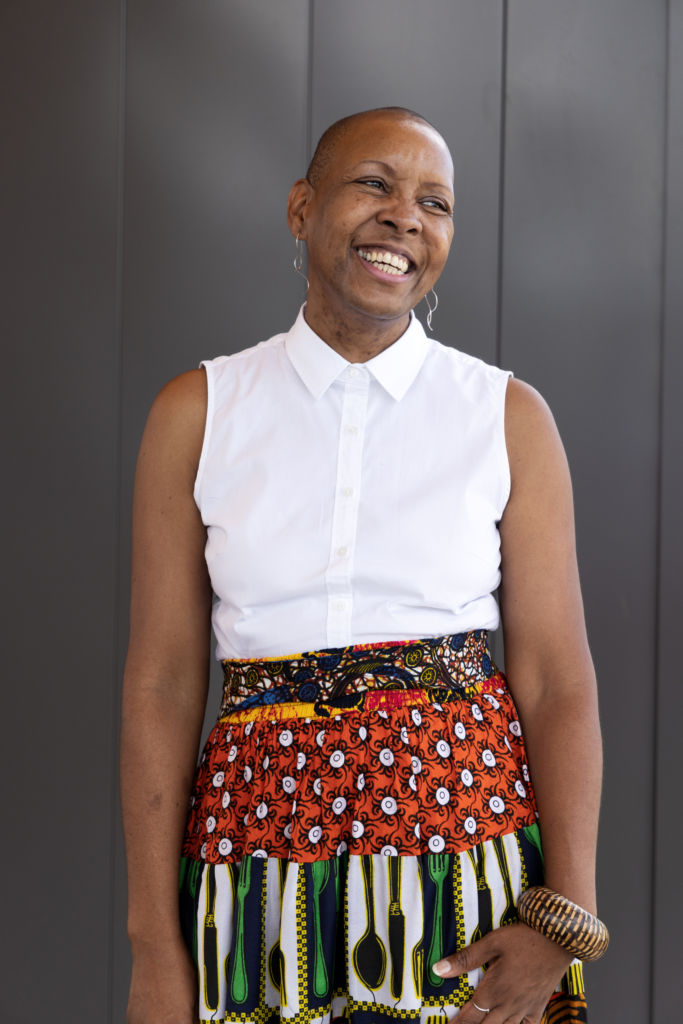PORTRAITS OF JONES VALLEY TEACHING FARM
January 18th, 2022Ama Ifágbàmílà’ Shambulia
Interviewed by Amanda Storey
Photography by Cary Norton
—

Twenty years ago, Jones Valley Teaching Farm was started as an urban farm in Birmingham’s Southside neighborhood. Driven by the belief in the transformative act of growing food and a commitment to centering youth in our work, we have continued to evolve to create solutions to drive economic mobility, food resiliency, and healthy communities. Over the years and with incredible support from our community, JVTF has created a nationally recognized education and apprenticeship model and grown to include seven Teaching Farm. As we look forward and begin our next chapter of growth through the Center for Food Education, we want to celebrate the mentors, change-makers, believers, volunteers, and leaders that have inspired our journey since the very beginning. Throughout this year, we will highlight these individuals in a series called, “Portraits of Jones Valley Teaching Farm.”
It seems appropriate to start this series with Chef Ama ‘Ifágbàmílà’ Shambulia because she has been an inspiration throughout Jones Valley Teaching Farm’s evolving journey as a Community Gardener, Board Member, Chef, Encourager, Teacher, Community Partner, and Mentor. In fact, the internship she created at WE Gardens and WE Community Café was model a for our Apprenticeship program. Please join us as we celebrate the deep gratitude, love, and respect we share for Chef Ama as we launch the “Portraits of Jones Valley Teaching Farm” series.
What has Jones Valley meant to you from the beginning?
I’m an earth worker and a food lover. That’s my space, and that’s what I do. I’m really familiar with growing in rural settings, but I was not familiar with growing in an urban setting, so that someone would dare to intend this type of work, I just thought it was the most beautiful thing. I thought it was the most beautiful thing. And so I had me a little plot, and I would come volunteer and that was a part of my continuing to learn and grow about growing. And it was just a beautiful thing to me. It wasn’t complicated. It wasn’t anything more than what it was, a sacred space in the heart of the city that community could access, that I could access, that I could come and work my little space and find peace and joy.
What important piece do you think JVTF has filled in the city?
What I have seen JVTF do, very intentionally and with sweet determination, you have created a space where everyone is welcomed as their authentic self. That can be messy, but I’ve seen you do that with a lot of love, a lot of intention, a lot of humility, a lot of genuineness, a lot of intelligence and that could be hard to not see. And that, in and of itself, is an art. And it’s a beautiful thing. It warms my heart to be able to witness that. And it is so, so important for our children to see that — for our children to be able to walk in this community, in the heart of downtown, and for children up the block to be able to come and know that this is their space and that it was created with them in mind in excellence. That means a lot. And the community to be able to have a space in excellence and beauty and know that it’s theirs, that’s everything.
What are your biggest dreams for the Center for Food Education?
I couldn’t have even imagined. I mean, but… just the babies! The babies! For them to be able to come here and connect with the earth, not only to connect with the earth, but we live in a modern world, and this is the best of both. So, they come to the farm, and they experience the best of growing, and then they come inside, and they experience state-of-the-art learning. It’s what children deserve, and it’s what all children deserve.
